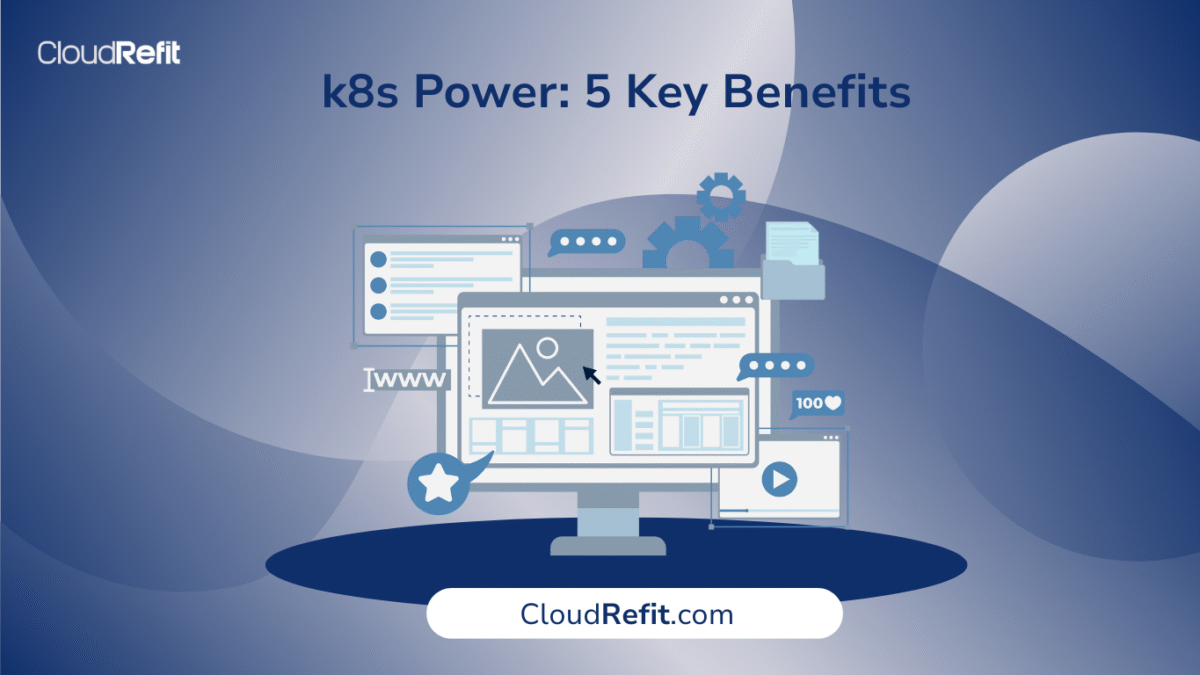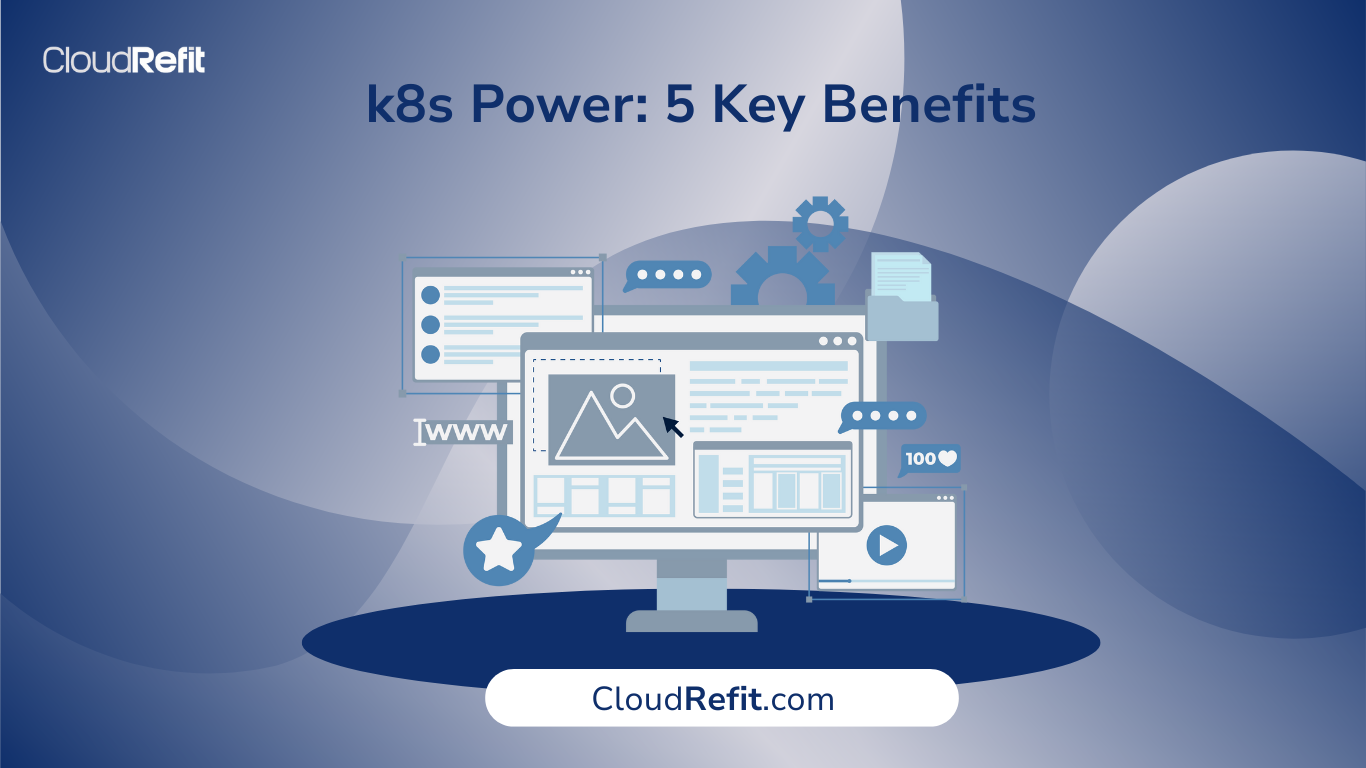k8s has redefined the way container orchestration is managed by automating deployment, scaling, and operations of application containers across clusters of hosts. In today’s rapidly evolving digital landscape, organizations are increasingly reliant on containerized applications to drive agility and innovation. One of the most transformative tools in this arena is k8s (pronounced “kay-eight-ess”), the widely adopted abbreviation for Kubernetes. At CloudRefit, we harness the power of k8s to build robust, scalable, and efficient cloud infrastructures that empower startups and SMEs to reduce operational costs and achieve digital transformation.

This article delves into what k8s is, its key benefits, and how CloudRefit leverages Kubernetes to streamline container management, accelerate deployment processes, and enhance overall system reliability.
What is k8s and Why is it Revolutionary?
k8s, short for Kubernetes, is an open-source platform for automating container operations. Developed by Google and now maintained by the Cloud Native Computing Foundation (CNCF), Kubernetes provides a powerful framework to run distributed systems resiliently. It manages the lifecycle of containers, ensuring that your application runs smoothly regardless of the underlying infrastructure.
Key aspects that make k8s revolutionary include:
1. Automated Container Orchestration:
Kubernetes automates the scheduling and running of containers across clusters of hosts. This ensures that containerized applications are deployed efficiently and can recover from failures without manual intervention.
2. Dynamic Scaling:
k8s allows for automatic scaling of applications based on real-time demand. Whether scaling up during traffic surges or scaling down during quieter periods, k8s adjusts resource allocation dynamically to maintain performance and cost efficiency.
3. Self-Healing Capabilities:
Kubernetes monitors the health of containers and, in the event of a failure, automatically restarts or replaces the affected containers. This self-healing feature ensures high availability and minimizes downtime.
4. Service Discovery and Load Balancing:
With built-in service discovery and load balancing, k8s makes it easy for containers to communicate with each other. It allocates IP addresses and a single DNS name for a set of containers, distributing network traffic to maintain optimal performance.
5. Declarative Configuration and Automation:
k8s uses declarative configuration files (usually in YAML format) to manage infrastructure. This approach ensures that the system’s desired state is maintained, allowing for consistent, reproducible deployments across different environments.
How CloudRefit Leverages k8s for Cloud Transformation ?
At CloudRefit, k8s is a central component in our strategy to deliver state-of-the-art cloud solutions. We integrate Kubernetes into our cloud infrastructure to empower our clients with a robust and agile environment. Here’s how CloudRefit uses k8s to drive digital transformation:
1. Streamlining Application Deployment:
CloudRefit employs k8s to automate the deployment of containerized applications. By defining the desired state of applications in declarative configuration files, we ensure that deployments are consistent and reliable. This automation accelerates the development lifecycle, allowing our clients to push updates quickly and efficiently.
2. Optimizing Resource Utilization:
With k8s, CloudRefit can dynamically allocate computing resources based on the current workload. This results in optimal resource utilization and significant cost savings. The auto-scaling capabilities of Kubernetes ensure that applications have the necessary resources during peak times while avoiding over-provisioning during off-peak hours.
3. Enhancing System Resilience:
Kubernetes’ self-healing features are pivotal in maintaining high system availability. In CloudRefit’s implementations, if a container fails or a node becomes unresponsive, k8s automatically reschedules the containers to healthy nodes. This resilience minimizes downtime and ensures continuous service delivery.
4. Facilitating Microservices Architecture:
The modular nature of Kubernetes supports the transition from monolithic architectures to microservices. CloudRefit leverages this by breaking down applications into smaller, manageable services that can be independently deployed and scaled. This not only improves application performance but also simplifies troubleshooting and maintenance.
5. Integration with CI/CD Pipelines:
CloudRefit integrates k8s into continuous integration and continuous deployment (CI/CD) workflows using tools such as Jenkins and GitLab CI/CD. This integration automates the entire software release process, reducing manual interventions and ensuring that every code change is seamlessly deployed in a production environment.
6. Supporting Hybrid Cloud Environments:
For clients with stringent security or regulatory requirements, CloudRefit implements hybrid cloud solutions that blend on-premise infrastructure with public cloud resources. Kubernetes plays a vital role in managing such hybrid environments, ensuring that mission-critical applications remain secure on-premise while benefiting from the scalability of the cloud.
Case Study: Accelerating Digital Transformation with k8s
One of our SaaS startup clients faced challenges with slow deployment cycles, inconsistent performance, and high operational costs due to an outdated, manually managed infrastructure. CloudRefit intervened by migrating their containerized applications to a Kubernetes-based platform.
Challenges
- Manual deployment processes were slow and prone to errors.
- Inconsistent environments led to performance issues and compatibility challenges.High costs and lack of
- scalability limited the company’s growth during peak demand.
Our Approach
- Infrastructure Audit:
CloudRefit conducted a comprehensive evaluation of the existing infrastructure, identifying inefficiencies and areas for improvement. - Migration to k8s:
The client’s applications were containerized using Docker and orchestrated using k8s. This migration ensured consistent deployment across development, testing, and production environments. - Automation Integration:
We integrated CI/CD pipelines with Kubernetes, automating deployment and reducing manual intervention. - Hybrid Cloud Implementation:
A hybrid model was adopted to secure sensitive data on-premise while leveraging the cloud for dynamic scaling of non-critical workloads.
Results
- 60% Reduction in Deployment Time:
Automated processes and Kubernetes orchestration significantly sped up the deployment cycle. - 40% Cost Savings:
Optimized resource usage and dynamic scaling led to substantial reductions in operational costs. - Improved System Stability:
The self-healing and auto-scaling features of k8s resulted in fewer downtimes and enhanced application performance, thereby increasing customer satisfaction.
Future Outlook for k8s with CloudRefit
CloudRefit is committed to continuously evolving its Kubernetes implementations to meet future technological challenges. Our future initiatives include:
- Integrating AI for Predictive Scaling:
Leveraging artificial intelligence and machine learning to predict workload demands and adjust resource allocation proactively. - Enhanced Security Features:
Investing in next-generation security protocols to further secure Kubernetes deployments against emerging threats. - Expanding Hybrid Cloud Capabilities:
Further developing our hybrid cloud models to seamlessly integrate on-premise and public cloud resources for optimal performance. - Advanced Automation and Monitoring:
Enhancing our CI/CD processes and monitoring tools to ensure that our Kubernetes environments are always running at peak efficiency and are highly resilient.
Conclusion
k8s (Kubernetes) is fundamentally transforming the way organizations manage and orchestrate containerized applications. By automating deployment, scaling, and management, k8s not only improves operational efficiency but also reduces costs and enhances system resilience. At CloudRefit, our strategic implementation of Kubernetes empowers businesses to achieve rapid digital transformation, streamline development processes, and build scalable, secure, and agile cloud infrastructures.
If you are ready to embrace the future of container orchestration and unlock the full potential of your IT infrastructure through k8s, CloudRefit offers the expertise and innovative solutions necessary to drive your digital transformation journey.
📩 Have questions about implementing k8s in your environment? Contact CloudRefit today for a free consultation!

